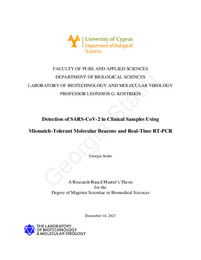Detection of SARS-CoV-2 in Clinical Samples Using Mismatch-Tolerant Molecular Beacons and Real-Time RT-PCR

View/
Date
2021-12-14Author
Stathi, GeorgiaPublisher
Πανεπιστήμιο Κύπρου, Σχολή Θετικών και Εφαρμοσμένων Επιστημών / University of Cyprus, Faculty of Pure and Applied SciencesPlace of publication
CyprusGoogle Scholar check
Keyword(s):
Metadata
Show full item recordAbstract
Infectious diseases that arise from pathogens are considered as a major threat towards global public health. Most recently, the novel coronavirus disease 2019 (COVID-19) caused by the severe acute respiratory syndrome coronavirus 2 (SARS-CoV-2) was denoted as the first pandemic of the 21st century, by the World Health Organization (WHO). Since its emergence in December 2019 in Wuhan, China, it has infected more than 255 million people resulting in more than 5 million deaths worldwide. Due to its severe consequences on humanity and its rapid spread, it is imperative to develop efficient and accurate diagnostic assays for early detection of infection by SARS-CoV-2. However, it is crucial to validate these diagnostic assays using clinical samples to ensure their sensitivity and specificity. This validation process is essential to evaluate the reliability of the assay’s performance and results. This study presents the design and validation of a mismatch-tolerant molecular beacon-based real-time reverse transcription (rt RT-PCR) assay, developed by the laboratory of Biotechnology and Molecular Virology, of the University of Cyprus (BMV, UCY), for the detection of SARS-CoV-2. The aforementioned assay was designed to detect the four genes S, E, M and N of SARS-CoV-2 and was initially tested by External Quality Assessments (EQAs). The assay was then validated through public diagnostic surveillance testing at the University of Cyprus (September 2020-January 2021), using clinical samples. Importantly, during this period, the pooling method was used, and 534 pools (~ 5 samples per pool) were collected from students and employees of the University, amounting to 2231 study subjects. Consequently, through this study, there were 16 individual clinical samples that were identified to be infected with SARS-CoV-2. Overall, this study provides the methodology necessary for the development of a detection assay for SARS-CoV-2 and highlights the importance of validation using clinical samples. Thus, through this study a powerful asset for the detection of SARS-CoV- 2 is presented, that is designed to identify the virus despite possible mutations that may arise and can be easily modified for other emerging pathogens.
